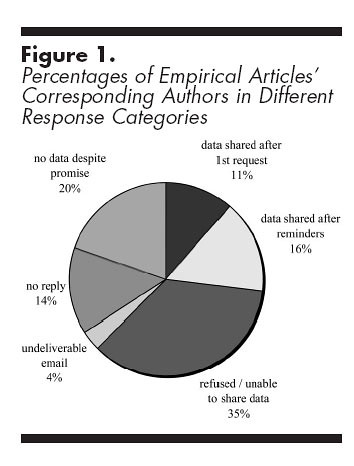
(graph from the Wicherts et al. study)
My paper advocating for replication standards in sociology has been conditionally accepted by Sociological Methods and Research, and I finished the revisions yesterday. Today, I learned about the study with the above graph, which is from the most recent issue of the American Psychologist. The Code of Ethics Standard for data sharing in sociology bears direct affinities to the one in psychology (one borrows language from the other, or both from the same source; it's unclear). Only in psychology, a condition of publication is that authors have to sign a statement of adherence to research ethics, which is presumed to encompass their agreement. The relevant APA code:
After research results are published, psychologists do not withhold the data on which their conclusions are based from other competent professionals who seek to verify the substantive claims through reanalysis and who intend to use such data only for that purpose, provided that the confidentiality of the participants can be protected and unless legal rights concerning proprietary data preclude their release. (American Psychological Association, 2001, p. 396)Anyway, the authors of this study asked the authors of 141 papers that appeared in American Psychological Association journals for the data from their papers for the purposes of re-analysis.* Only 27% ended up providing their data after repeated requests from the authors. Put another way, 73% of what you read as findings in the most esteemed journals in psychology are not available for independent verification by others.
Does someone really have to go and do a study like this for sociology for it to be believed that this is also a problem in our discipline?
* Wicherts, Jelte M.; Borsboom, Denny; Kats, Judith; Molenaar, Dylan The Poor Availability of Psychological Research Data for Reanalysis. American Psychologist. 61(7), Oct 2006, 726-728. The authors used a census of articles from the last 2 issues of 2004 and thus the 141 articles do not comprise some sample selected for their being more or less likely to share. [HT: John Hoffmann]

No comments:
Post a Comment